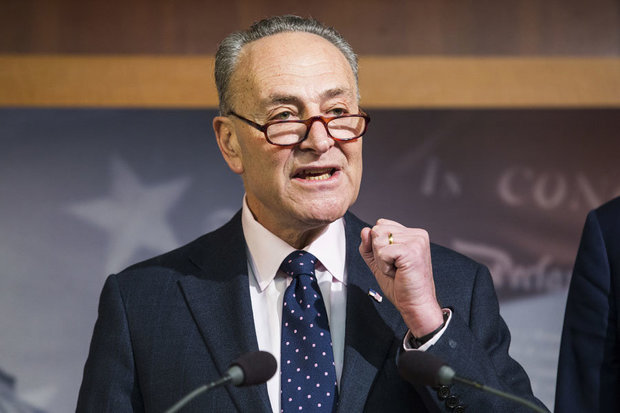

WASHINGTON (AP) — Several of President-elect Donald Trump’s Cabinet choices have not completed a full review to avoid conflicts of interest, the government’s ethics office says, even as Republican senators move quickly to hold at least nine confirmation hearings next week.
In a letter to Senate leaders, the director of the Office of Government Ethics described the current status of several nominees, some of whom are billionaires and millionaires, in the ethics process and expressed concern about the lack of ethics reviews just days from committee hearings.
The Associated Press obtained a copy of Walter Shaub’s letter.
“During this presidential transition, not all of the nominees presently scheduled for hearings have completed the ethics review process. In fact, OGE has not received even initial draft financial disclosure reports for some of the nominees scheduled for hearings,” Shaub wrote to Senate Minority Leader Chuck Schumer, D-N.Y., and Sen. Elizabeth Warren, D-Mass.
Republicans are intent on getting as many of Trump’s choices through the arduous confirmation process as quickly as possible so his team will be in place soon after Trump takes the oath of office on Jan. 20. Democrats have complained that the GOP is moving too fast and that they lack information about some of the wealthiest Americans to serve a president.
Schumer said in a statement Saturday that the letter “makes crystal clear that the transition team’s collusion with Senate Republicans to jam through these cabinet nominees before they’ve been thoroughly vetted is unprecedented.”
The forms in question are financial disclosures certified by the ethics office and also written ethics agreements between the nominee and the office that identify potential conflicts of interest and the ways in which the nominee will resolve those conflicts. They are required by the Ethics in Government Act of 1978, passed after the Watergate scandal.
One of the committees that hasn’t yet received the forms is the Senate Health, Education, Labor and Pensions Committee, which has scheduled a hearing next week for Betsy DeVos, Trump’s pick to lead the Education Department.
Committee aides said the panel held hearings for former Education Secretary Roderick Paige and former Labor Secretary Elaine Chao before they received the same forms in 2001, and that they received the documents days after each of those hearings. Both were confirmed to serve in President George W. Bush’s Cabinet.
That committee’s rules state that the committee cannot hold a vote on the nominee without the ethics form. In a statement, the committee chairman, Sen. Lamar Alexander, R-Tenn., said the committee is going to “follow the Golden Rule and use the same procedures for these nominees that we did in 2001 for President Bush’s nominees and in 2009 for President Obama’s nominees.”
Aides to the Senate Judiciary and Foreign Relations committees said they had received the ethics forms for Sen. Jeff Sessions, Trump’s pick for attorney general, and Rex Tillerson, Trump’s choice for secretary of state. A spokeswoman for the Commerce, Science and Transportation Committee said they had also received the forms for Chao, whom Trump has picked as his transportation secretary.
Shaub did not list which of Trump’s Cabinet choices hadn’t turned in their disclosures. But other confirmation hearings next week include Rep. Mike Pompeo, R-Kan., for director of the Central Intelligence Agency; Chao for transportation secretary; retired Marine Gen. John Kelly for homeland security secretary; Ben Carson for housing secretary; Wilbur Ross for commerce secretary; and retired Gen. James Mattis for defense secretary.
Committees handling those nominations did not return a request for comment on the records.
In the letter, Shaub said the lack of disclosure has left some of the nominees “with potentially unknown or unresolved ethics issues” just before their scheduled hearings.
He said the intensive process of checking nominees and creating the agreements has been complicated by the packed Senate hearing schedule and Trump’s announcements of his future nominees before consulting the office for evaluation of ethics issues. Traditionally, a president or president-elect’s picks have not been announced until the office has already cleared the nominees, Shaub said.
“In the past, the ethics work was fully completed prior to the announcement of nominees in the overwhelming majority of cases,” Shaub wrote.
Shaub was appointed by President Barack Obama to a five-year term in 2013 to lead the office, which is an independent agency within the government. He had worked at the office for several years before that, including during the Republican Bush administration. The office attracted attention in November when it tweeted congratulations to Trump for a “total divestiture” that he had not promised.
Under divestiture, an incoming federal official can sell off massive investments, defer paying capital gains and house the proceeds in Treasury bonds or diversified mutual funds.
But Trump had not then confirmed — and still hasn’t — that he will turn over any assets as part of a divestiture.
Trump is expected to discuss the future of his business at a news conference Wednesday, the same day as many of the confirmation hearings.

Be the first to comment